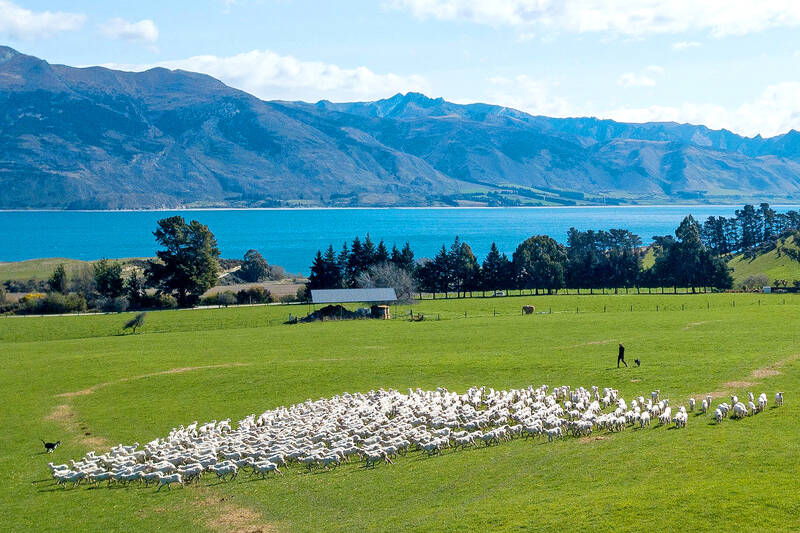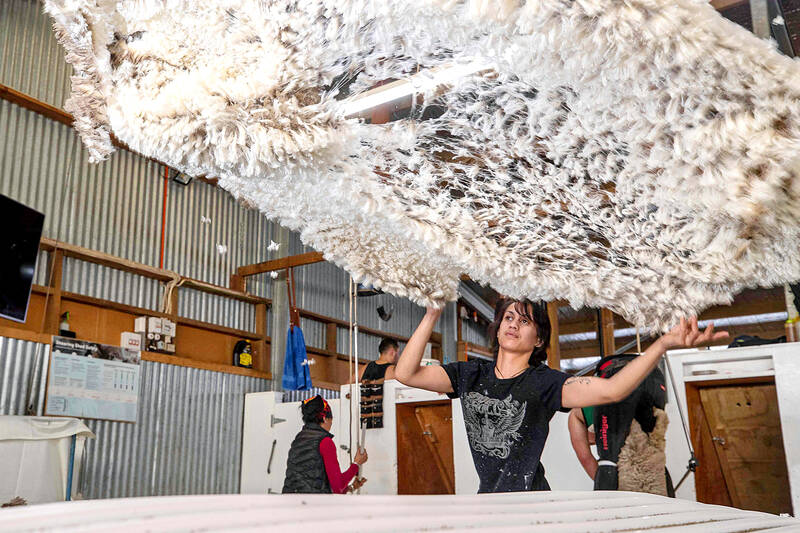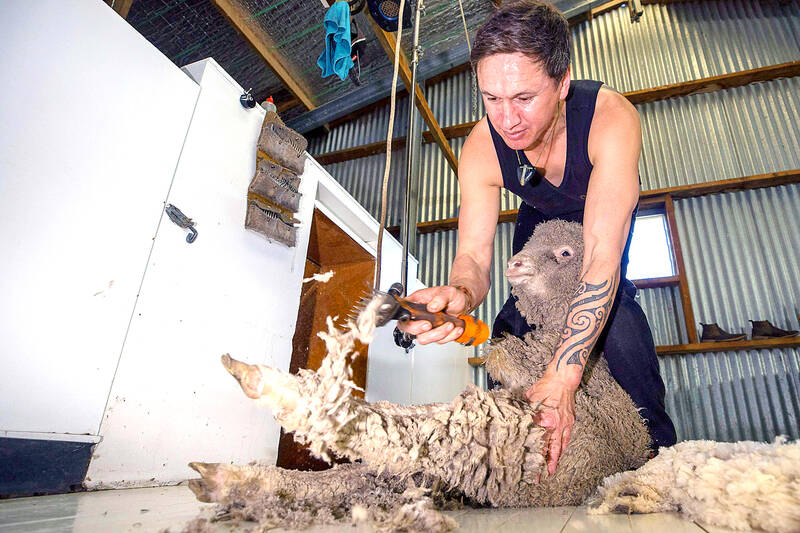Classical music, soft mattresses and the gentlest touch of a wool clipper: welcome to the New Zealand farm indulging what may be the world’s most pampered sheep.
Forget any preconceptions of rough-hewn shearers manhandling the flock as they quickly deprive them of their fleece in crowded, noisy wool-sheds.
At Lake Hawea Station on New Zealand’s South Island, owners Geoff and Justine Ross are advocates of the gentler, more soothing art of “slow-shearing.”

Photo: AFP
The sounds of Debussy, Vivaldi and Mozart may be wafting through the shed as shearers usher the ewes from their pens before trimming off their thick wool with slow, methodical strokes of the clippers.
Shearers are paid according to the sheep’s overall experience: stress, bruises and cuts can lead to lower wages. The trimming is performed on pristine whitewashed boards, to better reveal any nicks inflicted on the sheep’s skin. Once shorn, each sheep is guided towards a chute, where it slides into a holding pen — landing not on gravel but on a soft mattress.
It’s sheep shearing, reconsidered from the sheep’s perspective.

Photos: AFP
“It came first from a place of care for the animal,” Justine Ross said. “We’re all about having happier, calmer sheep. That starts with the way we treat them.
Ross said that they raised lambs in our first season.
“Once you see their personality and their unique character, you know the great responsibility of their care. And we have 10,000.”

Photo: AFP
SILENCE FOR THE LAMBS
On the station, there are “silent yards” where working dogs are trained not to bark while moving the merino flock.
In the hospital paddock, sick sheep get extra nutrition and medical treatment.
“You lose animals in farming, that’s a fact, but sometimes with a little extra love and care, they come good,” Ross said.
After reading that cows produce more milk if played classical music, Ross decided to make additions to the playlist in the shearing shed, where high-tempo rock, pop or rap is typically heard.
“We sometimes play Mozart. Some dairy farmers use it as a way to calm the animals,” Ross said. “Vivaldi’s Four Seasons is probably my favorite. We’re just trying stuff to build a case for less stress for the animal and a calmer, happier shed.”
New Zealand is home to five million people and 25 million sheep.
It is one of the world’s main wool exporters, sending 84 million tonnes, worth US$232 million, overseas in the last financial year.
Shearing, meanwhile, is hard, physical work.
It demands skill and stamina to handle the sheep. Each weighs up to 60 kilograms and can give the occasional painful kick. A good shearer trims several hundred sheep per day.
Traditionally, shearing was about speed, with little concern given to the occasional cut. Nowadays, animal welfare is a key factor, said Carolyn Clegg from New Zealand’s shearing association.
The priority remains trimming the best quality wool, she said, “but that extends to the sheep — you don’t want them cut up or under stress, because that affects their welfare.”
‘RELAXED AT ALL TIMES’
On the Lake Hawea station, farm manager Jack Mansfield said he likes to see “a nice slow, tidy job with the sheep relaxed at all times.” Pay is based on how the sheep are handled — known as stockmanship — and whether they are free of scratches, with the extra care coming at the cost of volume.
“We’re possibly down 50 sheep a day, which probably ends up being a couple of NZ$100 out of our back pockets,” said shearing gang leader Kevin Patrick O’Neill.
“That is replaced with a bonus from the farmer.”
The slower pace also means the sheep are less inclined to wriggle or kick.
“If we’re calm and relaxed, the sheep are too,” O’Neill added.
After selling their successful vodka business to an international spirits company, Geoff and Justine Ross bought the sheep station in 2017, determined to make it sustainable.
It was the first New Zealand farm to be certified as carbon clear by a government research institute.
In addition to keeping emissions down, the couple also wanted to reduce stress on their sheep.
And focusing on animal welfare has business benefits too, said Justine Ross.
“Our clients are demanding animal welfare credentials as part of their fiber purchasing. If an animal isn’t stressed — full of that fight-or-flight energy — then they will use that energy to grow more wool,” she said. UK-based merino knitwear firm Sheep Inc is one of the companies that buys their wool.
Co-founder Edzard van der Wyck said they were drawn to Lake Hawea because of its carbon-clear status and animal welfare policy.
“If you bring less stress into a sheep’s life, there is less breakages in the wool fiber, so the quality sustains itself,” he said.

The canonical shot of an East Asian city is a night skyline studded with towering apartment and office buildings, bright with neon and plastic signage, a landscape of energy and modernity. Another classic image is the same city seen from above, in which identical apartment towers march across the city, spilling out over nearby geography, like stylized soldiers colonizing new territory in a board game. Densely populated dynamic conurbations of money, technological innovation and convenience, it is hard to see the cities of East Asia as what they truly are: necropolises. Why is this? The East Asian development model, with

Desperate dads meet in car parks to exchange packets; exhausted parents slip it into their kids’ drinks; families wait months for prescriptions buy it “off label.” But is it worth the risk? “The first time I gave him a gummy, I thought, ‘Oh my God, have I killed him?’ He just passed out in front of the TV. That never happens.” Jen remembers giving her son, David, six, melatonin to help him sleep. She got them from a friend, a pediatrician who gave them to her own child. “It was sort of hilarious. She had half a tub of gummies,

The wide-screen spectacle of Formula One gets a gleaming, rip-roaring workout in Joseph Kosinski’s F1, a fine-tuned machine of a movie that, in its most riveting racing scenes, approaches a kind of high-speed splendor. Kosinski, who last endeavored to put moviegoers in the seat of a fighter jet in Top Gun: Maverick, has moved to the open cockpits of Formula One with much the same affection, if not outright need, for speed. A lot of the same team is back. Jerry Bruckheimer produces. Ehren Kruger, a co-writer on Maverick, takes sole credit here. Hans Zimmer, a co-composer previously, supplies the thumping

There is an old British curse, “may you live in interesting times,” passed off as ancient Chinese wisdom to make it sound more exotic and profound. We are living in interesting times. From US President Donald Trump’s decision on American tariffs, to how the recalls will play out, to uncertainty about how events are evolving in China, we can do nothing more than wait with bated breath. At the cusp of potentially momentous change, it is a good time to take stock of the current state of Taiwan’s political parties. As things stand, all three major parties are struggling. For our examination of the